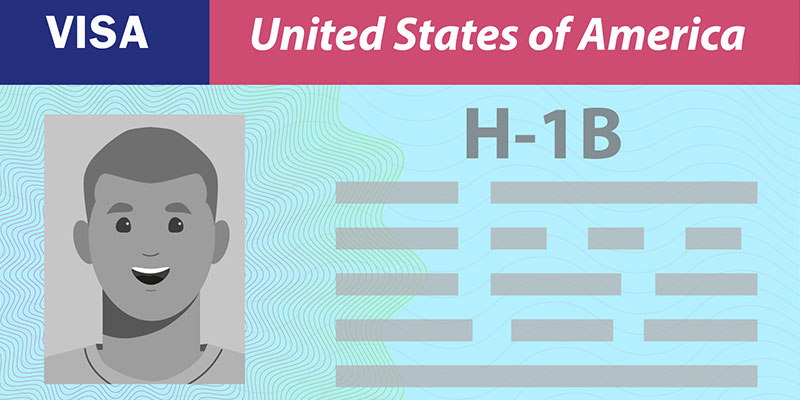
In this article, we have discussed the following:
It is also interesting to know the difference between H1B and F1, different types of visas.
Heading to the USA for work? To do so, you must apply for an H1B or B1 visa, depending on the purpose of your stay. The H1B is a non-immigrant visa granted for employees from other countries who wish to live and work in the USA. One of the basic requirements for an H1B visa is to find a US-based employer who offers specialty occupations in IT, medicine, engineering, architecture, research, etc.
As an applicant, you must have a bachelor's degree or an equivalent educational qualification. The H1B is issued by the United States Citizenship and Immigration Services and is valid for three years and can be extended for another three years. Extending your H1B for three years gives you ample time to apply for your permanent residency or Green Card.
What is the B1 Visa?
B-1/B-2 visas are temporary, non-immigrant visas that permits foreigners to visit to the United States for business purposes to the US for a short period without working or receiving payment from US sources. Certain nationals can enter the US without a visa and remain in the country for up to ninety days for trade reasons. The program is known as the business waiver program. You can travel on a B1 or B2 visa for:
Let's now analyze the differences between H1B and B1 visas.
Objective
Education
Permanent Residency
Employment
Basic Requirements
Duration of validity
Visa Dependents
| Features | H1B | B1 |
|---|---|---|
| Issued to those who work for US employers on specialty occupations. | Issued to foreign visitors arriving in the United States for business purposes. | |
| The applicant must hold a degree from an accredited US college or university (or the equivalent in a foreign country). The degree must be for a specialty occupation related to the job in the U.S. | A bachelor's degree is the basic requirement for graduate-level workers. The bachelors degree should be relevant to the services provided. Applicants will also need enough work experience or a combination of work experiences. These qualifications may also be considered as equivalents to a degree. | |
| Applicants can also apply for permanent residency or green card. | B1 visa holders are not permitted to apply for permanent residency. | |
| Foreign nationals can use the H1B visa to work for US employers. Basically, the applicant must be a permanent, full-time employee of a US company. | The B1 visa is for professionals arriving in the US on behalf of a foreign organization contracted with a US company to perform services. As a basic prerequisite, applicants must have a permanent job in a non-US company and must also be paid. | |
| The employer must sponsor the H1B visa and bear all the expenses. The H1B employee must have a a bachelor's degree as a basic requirement. | The B1 visa is basically issued for applicants to come to the US only for business and not for employment. The applicant should remain in the US only for a specific duration and has the financial means to travel to the country. The applicant clearly intends to reside only outside the US. | |
| The initial validity period is three years, but can be extended to an additional three years if the applicant has a valid job in the US. | The visa extension is not likely and it is valid for six months. The applicant cannot stay for more than a year. | |
| The H4 visa is available for H1B holder's family members like the spouse, parents, and unmarried children. It allows them to stay with the H1B holder. | The B1 visa does not allow any dependents. The family members must apply for a B2 visa, which is a tourist visa. |
Also Read: TN Visa, H1B, E3 & Other US Non-Immigrant Visa: An In-depth Exploration
You should note that the B1 visa has very limited opportunities, unlike the H1B, which is popular for the immense benefits it gives the applicant. Hence, you should be clear about the purpose of your visit to the US and apply for the right visa. For comprehensive information on H1b visas and other immigration-related details follow Techfetch H1B a one-stop portal for all things H1B.
**Disclaimer: All information regarding the H1B visa is subject to change. Kindly refer to the USCIS official website for the latest updates.